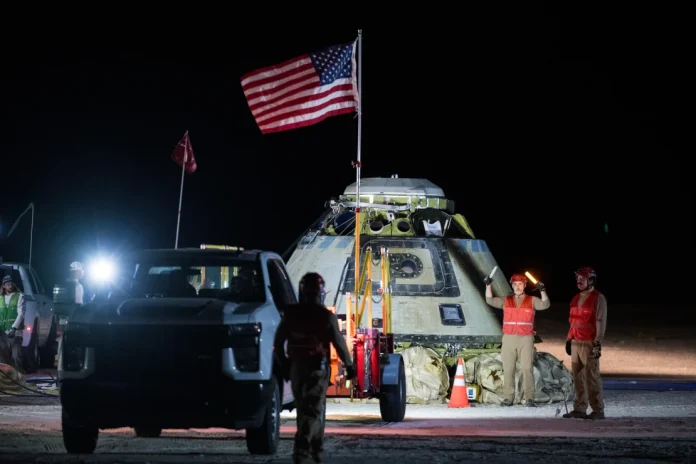Boeing’s Starliner spacecraft completed an uncrewed landing in the New Mexico desert on Friday, concluding a three-month test mission. The capsule returned empty, leaving astronauts on the station for five or six months.
NASA astronauts Butch Wilmore and Sunita Williams, who became the first crew to fly on Starliner in June, remained aboard the ISS when Starliner autonomously undocked at 18:04 Eastern Time (10:04 GMT) on Friday.
Six hours after departing from the International Space Station, Starliner landed through parachute at White Sands Space Harbor, an area within the vast rocket range of the same name, which had previously been used for training NASA space shuttle pilots. The return to Earth required Starliner to execute precise orientation during its descent into the densest part of the Earth’s atmosphere while continuing to travel at orbital velocity – typically over 27,400 kilometres per hour.
This mission was intended to be the final test flight before NASA certifies Starliner for routine missions; however, the agency’s decision last month to exclude astronauts from the capsule for safety reasons has cast doubt on the spacecraft’s certification prospects, despite Boeing’s successful return.
The astronauts remaining aboard the ISS with additional supplies and provisions are set to return to Earth on a SpaceX spacecraft in February 2025, thus spending a total of eight months on their mission instead of the planned eight days. Apart from them, there are seven other astronauts on the ISS who arrived at different times on various spacecraft, including the Russian Soyuz capsule.
The story of Boeing’s Starliner spacecraft began with a June launch of the long-delayed crew debut and quickly evolved into a drawn-out cliffhanger of a mission plagued by engine failures and helium leaks. For several months, the return of the astronauts was in jeopardy as engineers endeavoured to understand the capsule’s issues.
Starliner, has been deemed safe for the return of these two astronauts, Boeing said, but NASA disagreed and instead booked a flight with SpaceX. The SpaceX flight is not scheduled to launch until the end of this month, meaning they will remain there until February. The situation raises questions about Boeing’s future in space – a domain in which the company has dominated for decades, until Elon Musk’s SpaceX emerged.
